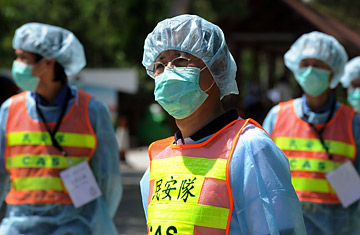
Masked workers wait at the entrance after a group of people formerly under quarantine from swine flu leave a holiday centre turned into quarantine center in Hong Kong
The "swine flu" was supposed to bring global commerce to a halt, drive global GDP down by 5%, and cost the economies across the world as much as $3 trillion dollars. In the process, as many as a million people were supposed to die. The forecasts for what the flu might have done to damage an already weak global economy shows many of the weaknesses of the of the press, world health monitoring agencies, and economists. The worst case about something is often by far and away the least probable case. Implying that the worst case is the probable case tests the public's belief in anything other than what they can see with their own eyes or hear with their own ears.
Businesses across America and much of the rest of the world were changing travel schedules, considering bringing people back to their homes, and preparing, at the worst, to make plans in the event that some portion of their employees were out of work. (See pictures of swine flu hitting Mexico.)
Airlines lost a great deal of money as travel dropped to and from countries which had documented cases of "swine flu." The pharmaceutical industry began shipping tons of flu medication around the world, and doctors began to get special training in diagnosing and treating the new flu strain.
No one will ever know what the governments in large countries like the U.S. and China spent preparing for a pandemic, but it was considerable, like preparing for a natural disaster or an economic event that might damage a country's financial system. (See pictures of soccer in the time of swine flu)
Fortunately, the flu pandemic did not materialize. The rate at which people are getting infected is slowing. The rate at which people are dying is decelerating even more. In a few weeks, the pandemic could be down to a few dozen cases. But, the latest caution from the WHO is that these flu viruses can become more virulent over time. No one knows how bad the mutations of the "swine flu" may be.
It will be very hard to tell what will happen in the next flu season, especially if a worse case of influenza does develop. One panic is expensive, but a second is a waste of money. Experts maintain that the difference of a few days could be the critical issue in the containment of influenza. If the public becomes complacent that the next epidemic will be mild and resists public health advice, then the economy really will face a disaster when a virulent influenza appears and spreads widely.
Unfortunately, money takes precedence over everything, even health. Businesses do not like to see their pockets picked twice by an unruly and inconsequential panic. That aversion to loss will only make things worse if thousands and thousands of people begin to die and commercial interests are slow to recognize it and slow to react.
— Douglas A. McIntyre
See pictures of thermal scanners hunting for swine flu.
For constant business updates, go to 24/7wallst.com.
